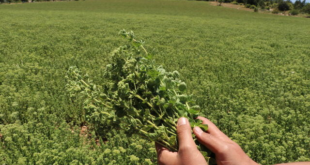Türkiye is faced with the danger of losing some 20 percent of its water resources by 2030, which will pose a significant risk to its food supply, according to a study by the Agriculture and Forestry Ministry.
The report studied how climate change would affect the country’s underground and surface water resources by 2100.

Temperature is expected to increase on average between 4 to 6 degrees Celsius across the country but the eastern and southeastern regions will become even hotter by another 1 to 2 degrees Celsius, the study said.
The number of days when the country experiences heat waves in a year may increase from 15 to 200, while more drought spells will be witnessed, according to the report.
The water stress will be felt more intensively toward the end of spring and during the summer months.
In the final quarter of the century, in high-altitude regions, the duration of snow cover is expected to shorten by up to 45 days.
The per capita freshwater availability is presently around 1,294 cubic meters annually. But with population growth, this amount is expected to drop below 1,000 cubic meters starting in 2030, the report said, warning that if necessary measures are not taken, Türkiye will join countries suffering from water scarcity.

The report predicts in the 15 basins where 49 percent of the population lives and supply 78 percent of the country’s agricultural products will face water shortage. This will pose risks to the food supply, according to the report.
In response to the impending threats, the officials will implement a drought early warning system and determine precautions to increase preparedness for possible drought.
The actions to be taken under the “Drought Management Plan” will help save up to 10,962 cubic hectometers annually, corresponding to Istanbul’s water needs for nine years.
The study also projects that as water use efficiency increases at households per capita, daily water consumption may decline from the current 229 liters to around 120 liters by 2030.

Meanwhile, the country’s largest sewage waste treatment facility was inaugurated in the province of Afyonkarahisar.
The facility is as big as 1,300 football fields and makes a contribution of some 56 million Turkish Liras to the country’s economy each year.
The facility cost 615 million liras to build.
“The water treated at the facility will be used to irrigate the farmlands in Afyonkarahisar,” Agriculture and Forestry Minister İbrahim Yumaklı said.
Construction works for 42 more of such treatment facilities are ongoing, the minister added.
Source: hurriyetdailynews.com
 THE GLOBAL WINDOW OF TURKISH FOOD AND AGRICULTURE The Global Window of Turkish Food and Agriculture Sector
THE GLOBAL WINDOW OF TURKISH FOOD AND AGRICULTURE The Global Window of Turkish Food and Agriculture Sector









